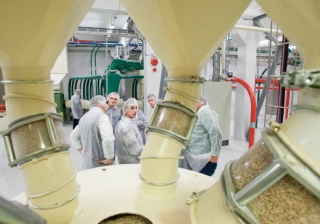Estonia, Foodstuff, Legislation, Markets and Companies
International Internet Magazine. Baltic States news & analytics
Friday, 19.04.2024, 11:21
Prosecutor's office demands punishment of EUR 10 mln for Tartu Mill
 Print version
Print version |
|---|
Prosecutor Marek Vahing asked
the court to find all three defendants guilty and to hand down a conditional
jail sentence of four years, with a probation period of four years, to Priit Saar, a prison sentence of nine
years to Leonid Dulub and a
pecuniary punishment of 10 million euros to Tartu
Mill.
The defense lawyers of all defendants asked the court to find their clients
not guilty. The court is to announce its verdict on Feb. 2.
The proceeding of Meelis Jurimae
was separated from the larger proceeding because he struck a deal with the
prosecutor's office. On Nov. 15 he was found guilty of belonging to a criminal
group and for helping to submit false data in tax declarations. He was meted
out a conditional sentence of three years, with a probation period of three
years. He also has to pay 1,319 euros of procedural expenses.
At the court proceeding which started last September Dulub, Saar and Tartu Mill did not plead guilty.
Tartu Mill has been charged with participation in a 1.2 million euro VAT fraud. The
company considers the charge unjustified, arguing that only a former employee
was involved.
According to the statement of charges, Tartu
Mill submitted false data in its VAT returns from January 2012 through
September 2013. The company's former purchasing manager is accused of running
the fraudulent scheme with the help of an eight-member criminal group. The
collected evidence indicates that members of the ring used more than 30 front
companies to declare transactions which in reality did not take place.
The fronts billed Tartu Mill for
those ostensible transactions and the company transferred the money into the
accounts of the cover companies controlled by the criminal group from where the
cash moved to members of the group including the purchasing manager. The cash
was used to pay the real suppliers of grain and rape and fund the group's
operation, including payments to its members.
Six members of the group were convicted in a plea bargain by the first-tier
Tartu county court already in 2014.








 «The Baltic Course» Is Sold and Stays in Business!
«The Baltic Course» Is Sold and Stays in Business!

